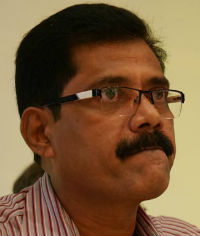 A few weeks ago, WSM asked its partners to fill in a survey on labour migration in order to prepare common interventions during the International Labour Conference in Geneva, from 4th to 16th June 2017. There was a lot of response!
A few weeks ago, WSM asked its partners to fill in a survey on labour migration in order to prepare common interventions during the International Labour Conference in Geneva, from 4th to 16th June 2017. There was a lot of response!Thanks to these very valuable inputs, we have been able to deliver a common statement WSM- International Young Christian Workers on this theme on the first day of the committee, on 5th June, which was a great success! These inputs have also helped to feed WSM interventions during the debate of the following days. We had a collective strategy of lobbying with the Belgian Trade Union ACV-CSC and with representative of the continents which brought very valuable field experience to the debates:
- M Ramesh Bhadal (GEFONT) and Ganesh Niroula (NTUC) from Nepal;
- William Charpantier (FEI) from Dominican Republic;
- Samory Ould Beye (CLTM) from Mauritania.
We were able to bring up some important points highlighted in the surveys, for example :
- The need to ratify Conventions 97 and 143 in order to protect the labour migrants better ;
- The importance to regulate recruitment agencies more strictly;
- The necessity to promote the « inclusive social dialogue » which means that social organizations of labour migrants should be able to dialogue with Trade Unions in order to enrich the official social dialogue structures with their concerns;
- The promotion of fair recruitment;
- To guarantee the access to social protection for everybody: labour migrants should benefit from the same rights as national workers;
- To promote national action plans to regularize undocumented labour migrants in order to allow them to benefit of their social and civic rights
In general, we can say that many of these demands have been included in the general conclusions of the debates. Those conclusions will give the International Labour Office (BIT) some milestones to work on for the following years. This document will also help all our organizations to lobby national governments in order to protect labour migrants better.









